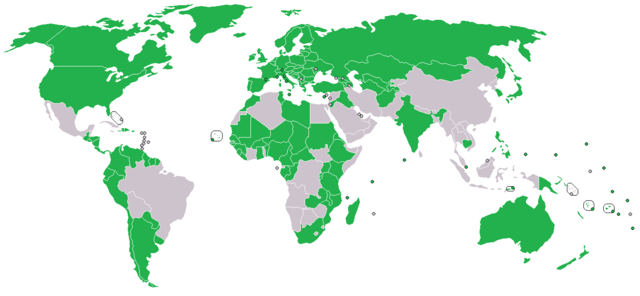International Code of Conduct against Ballistic Missile Proliferation
From Wikipedia, the free encyclopedia
The International Code of Conduct against Ballistic Missile Proliferation, also known as the Hague Code of Conduct (HCOC), was established on 25 November 2002 as an arrangement to prevent the proliferation of ballistic missiles.

The HCOC is the result of international efforts to regulate access to ballistic missiles which can potentially deliver weapons of mass destruction. The HCOC is the only multilateral code in the area of disarmament which has been adopted over the last years. It is the only normative instrument to verify the spread of ballistic missiles. The HCOC does not ban ballistic missiles, but it does call for restraint in their production, testing, and export.
As agreed by the conference in The Hague, Austria serves as the Immediate Central Contact (Executive Secretariat) and therefore coordinates the information exchange of the HCOC.
To create a link between the UN and the HCOC, which was not negotiated in the context of the UN, a Resolution regarding the HCOC was tabled in the course of the 59th as well as the 60th and 63rd sessions of the General Assembly in New York City.
Since the HCOC's entry into force, sixteen Conferences of Subscribing States of the HCOC have been held. The 16th Regular Meeting of Subscribing States of the HCOC took place from 6–7 June 2017 under the chairmanship of Ambassador Marek Szczygieł from Poland.
India joined the HCOC on 1 June 2016.[1][2]
While the Missile Technology Control Regime (MTCR) has a similar mission, it is an export group with only 35 members.
Membership
Summarize
Perspective
Since the signing and entering into force of the HCOC Code in November 2002 in The Hague, (Netherlands) the number of signatories has increased from 96 to 138 (136 UN members, the Cook Islands and the Holy See).[3] India, which joined on 1 June 2016, is the latest signatory of the HCOC.
The 57 non-signatory UN states are:
 Algeria
Algeria Angola
Angola Bahamas
Bahamas Bahrain
Bahrain Bangladesh
Bangladesh Barbados
Barbados Belize
Belize Bhutan
Bhutan Bolivia
Bolivia Botswana
Botswana Brazil
Brazil China
China Cuba
Cuba Djibouti
Djibouti Egypt
Egypt Equatorial Guinea
Equatorial Guinea Grenada
Grenada Indonesia
Indonesia Iran
Iran Israel
Israel Ivory Coast
Ivory Coast Jamaica
Jamaica Kuwait
Kuwait Kyrgyzstan
Kyrgyzstan Laos
Laos Lebanon
Lebanon Lesotho
Lesotho Malaysia
Malaysia Mauritius
Mauritius Mexico
Mexico Myanmar
Myanmar Namibia
Namibia Nauru
Nauru Nepal
Nepal Niue
Niue North Korea
North Korea Oman
Oman Pakistan
Pakistan Qatar
Qatar Saint Lucia
Saint Lucia Saint Vincent and the Grenadines
Saint Vincent and the Grenadines São Tomé and Príncipe
São Tomé and Príncipe Saudi Arabia
Saudi Arabia Solomon Islands
Solomon Islands Somalia
Somalia South Sudan
South Sudan Sri Lanka
Sri Lanka Syria
Syria Swaziland
Swaziland Thailand
Thailand Togo
Togo Trinidad and Tobago
Trinidad and Tobago United Arab Emirates
United Arab Emirates Vietnam
Vietnam Yemen
Yemen Zimbabwe
Zimbabwe
No states with limited recognition have signed this code.
References
External links
Wikiwand - on
Seamless Wikipedia browsing. On steroids.
